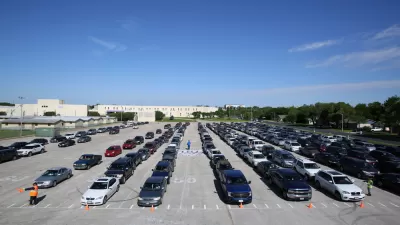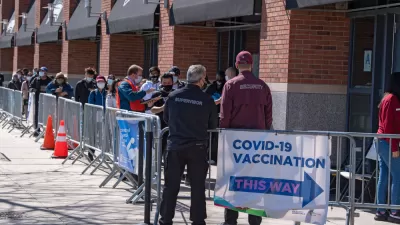The pandemic has created even more obstacles to participation in society for those without a car.

Madeline Brozen critiques the uses of drive-ins and drive-thrus as the chosen response for services during the pandemic, first noting how completely the concepts have caught on in an already car-centric country:
Given the convenience and privacy of the automobile, it is no surprise that drive-ins and drive-thrus have surged during COVID-19. This fall, people could traverse spooky Halloween drive-thru trails, visit drive-thru pet sanctuaries, and view entire independent film festivals from their cars. Governments and healthcare providers, meanwhile, are offering drive-thru food distribution, COVID-19 testing, and flu shots.
There's a big problem with the popularity of drive-ins and drive-thrus during the pandemic, according to Brozen: they're only available people that drive.
Without a car, you can’t see the elaborately carved pumpkins, smile at the rescue cow, or enjoy most outdoor movies. There are worse things, of course, than being denied access to a drive-thru burger, or to an Instagrammable haunted Halloween drive-thru. But it is much more concerning if you can’t get food from the food bank, or know if you have tested positive for COVID-19.
According to Brozen, the country already denies access to opportunity to those without automobiles, whether by choice or necessity, and the current trends would only strengthen those obstacles at the worst possible time. And like so many other consequences of auto dependency in the United States, both racial justice and social justice suffer as a result.
Brozen notes that the tendency toward driving-thru services during the pandemic is a set back for a growing movement in planning departments to slow the spread of auto-dependency by banning drive-thrus altogether. "Minneapolis, for example, prohibited the opening of new drive-thru facilities after 2019, saying they were inconsistent with the city’s long-term plans to reduce greenhouse gas emissions. A handful of other cities in California, Montana, and New Jersey have instituted their own temporary or permanent bans too," writes Brozen.
The source article offers a few policy prescriptions to ensure that drive-thrus and drive-ins don't exclude people without cars.
FULL STORY: Opinion: The Problem with Drive-In Services — Now and After COVID-19

Trump Administration Could Effectively End Housing Voucher Program
Federal officials are eyeing major cuts to the Section 8 program that helps millions of low-income households pay rent.

Planetizen Federal Action Tracker
A weekly monitor of how Trump’s orders and actions are impacting planners and planning in America.

Ken Jennings Launches Transit Web Series
The Jeopardy champ wants you to ride public transit.

Washington Legislature Passes Rent Increase Cap
A bill that caps rent increases at 7 percent plus inflation is headed to the governor’s desk.

From Planning to Action: How LA County Is Rethinking Climate Resilience
Chief Sustainability Officer Rita Kampalath outlines the County’s shift from planning to implementation in its climate resilience efforts, emphasizing cross-departmental coordination, updated recovery strategies, and the need for flexible funding.

New Mexico Aging Department Commits to Helping Seniors Age ‘In Place’ and ‘Autonomously’ in New Draft Plan
As New Mexico’s population of seniors continues to grow, the state’s aging department is proposing expanded initiatives to help seniors maintain their autonomy while also supporting family caregivers.
Urban Design for Planners 1: Software Tools
This six-course series explores essential urban design concepts using open source software and equips planners with the tools they need to participate fully in the urban design process.
Planning for Universal Design
Learn the tools for implementing Universal Design in planning regulations.
Heyer Gruel & Associates PA
Ada County Highway District
Institute for Housing and Urban Development Studies (IHS)
City of Grandview
Harvard GSD Executive Education
Toledo-Lucas County Plan Commissions
Salt Lake City
NYU Wagner Graduate School of Public Service





























